How Hospitals are Losing Millions$$$ from Underpaid Claims!

With all of the changes that are constantly taking place in healthcare it has always been difficult for administrators to keep up with the billing and collection of patient claims. Now with the transition to ICD-10 and the addition of thousands of codes and new regulations it has become even more arduous for hospitals to efficiently collect all the funds they are have so earned. Once claims have been submitted to their third party payers, this is where the losses start to pile up. 
Denied claims will come back either fully or partially denied for a number of reasons such as those listed below.
- Contractual misinterpretations & payments
- Fee-schedule changes
- Miscalculation/Errors in risk-payment reconciliations
- Inappropriate denials or down-coding of claims,
- Non-payments.
Even though most hospitals have a process in place to address Denied Claims there is still an Industry average of up to as much as 7% of all claims that have ended up as zero balance accounts that are actually left underpaid. That is a significant amount of revenue lost when 7 out of 100 claims submitted are left underpaid and in most cases a loss of Millions of Dollars to an average size hospital.
The reason for this is usually a staffing issue where not enough resources are available. Revenue Cycle departments have to analyze why a claim was denied, determine if you agree with the denial, research why you don’t agree, rebill those claims you found to be improperly underpaid or rejected and then follow-up and negotiate a settlement and then follow-up again to be sure the agreed to payment was made. Obviously this takes a lot of time and effort which in most cases hospitals address only the high dollar claims leaving the lower dollar claims to get to when they have more time or just zero balancing them out thus leaving revenue effectively earned as uncollected. There is also software available that does address many issues of denial claims but is not one hundred percent effective either and does of course have to be compatible with the providers billing software.
The answer to this for many hospitals is to outsource their denial claims management to a company that will work these claims to recover as much revenue as possible for a fee that is a percentage of the funds recovered. This is likely generating more revenue than committing hospital staff but the problem is the reasons for the denied claims continue on without any attention to correcting the issues that caused the underpayments.
One of the most effective programs many hospitals are now using to address the whole issue of underpaid claims is called an Underpayment Recovery Audit. There are only a few companies that have the resources and technologies available to deliver highly effective results. A thorough underpayment recovery audit will include a review of all zero balance accounts from the past 24 months. These would include all claims that have been set to a zero balance whether they were paid in full, paid partially or totally denied. The review of these claims should uncover about 6%-7% of a claims reviewed as being underpaid. Once identified as an underpaid claim, a rebilling of that claim would take place to recover those funds. The most effective companies are recovering up to 75% of the underpaid claims identified.
A big advantage moving forward is that during the audit review and collection process which could take up to two years, all current months zero balance data is also reviewed each month moving forward. Additionally the audit and review firm should be working with the hospital staff to try and correct many of the reasons for denial claims as the process is ongoing, thus reducing the amount of future denied claims. As an example of this success you might see a hospital with a Billion Dollars in annual revenue that goes through an Underpayment Recovery Audit and recovers as much as 15 Million Dollars. However not every company that claims they will provide this type of audit review is capable of providing that type of results. Oh and by the way this service should be done on consignment with no upfront fees. Payment of any fees should only come from funds recovered.
Receive a full written Presentation on the
TBS Underpayment Recovery Audit HERE!
Tags: Denied Claims, payment integrity audit, underpayment recovery
 TRANSNATIONAL
TRANSNATIONAL 917.257.4492
917.257.4492






